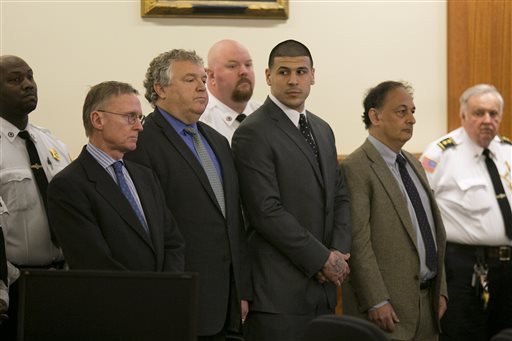MICHELLE R. SMITH, Associated Press
FALL RIVER (AP) — Even after he was convicted of first-degree murder and sentenced to life in prison without parole, former New England Patriots star tight end Aaron Hernandez is nowhere near done with his legal troubles. He still faces double murder charges in Boston, as well as civil lawsuits over the killings and a lawsuit in Florida from a former friend who said he was shot in the face and left for dead after arguing with Hernandez.
A jury yesterday found Hernandez guilty of the June 2013 killing of Odin Lloyd, who was dating the sister of Hernandez’s fiancee. Lloyd was killed — shot six times in a deserted industrial park less than a mile from Hernandez’s home — for reasons that still remain unclear. Hernandez’s lawyer acknowledged his client witnessed the crime but insisted he did not do it.
After the verdict, Hernandez was brought to a state prison less than a 4-mile drive from Gillette Stadium, the place where he once used to catch touchdown passes by Tom Brady in front of tens of thousands of fans. He will eventually be moved to another maximum-security institution.
A first-degree murder conviction in Massachusetts automatically triggers an appeal to the Supreme Judicial Court. A date for the Hernandez appeal wasn’t immediately set.
Hernandez also is charged in a 2012 double killing in Boston. His alleged connection to that slaying emerged as the Lloyd investigation unfolded. Prosecutors in Boston say that Hernandez killed two men, Daniel de Abreu and Safiro Furtado, after one of them accidentally bumped into him and spilled Hernandez’s drink at a nightclub. Hernandez has pleaded not guilty to two counts of murder.
Hernandez told a friend he thought the man was “trying” him, and surveillance video outside the club showed Hernandez pacing back and forth while his friend tried to calm him down.
Later, Hernandez drove around until he saw the men get in a car, followed them and shot at them from a silver SUV at a stop light, prosecutors said. A third man in their car also was shot but survived.
The judge in the Lloyd case barred prosecutors from telling jurors about the Boston double killing. Jurors in the Lloyd case yesterday said that after the verdict the judge told them about the 2012 case, information they said only affirmed to them that they had made the right decision.
About six weeks after that shooting, Hernandez signed a five-year, $40 million contract with the Patriots, and he went on to play for another season before Lloyd was killed. He was cut from the team soon after being arrested in Lloyd’s killing in June 2013.
Suffolk County prosecutors said yesterday they don’t have an estimate on when Hernandez could stand trial for the double homicide. The trial had been scheduled to begin May 28, but a judge agreed in November to delay the case indefinitely so Hernandez’s lawyers could focus on the Lloyd case. The first step will be to hold a pre-trial status hearing.
“We expect to go in to court in the coming days with defense counsel to set a new court date and from there set a new trial track,” Jake Wark, a spokesman for Suffolk County District Attorney Daniel Conley, said a few hours after Hernandez was convicted and sentenced.
Hernandez’s legal team, James Sultan, Michael Fee and Charles Rankin, left the courthouse yesterday without commenting.
Lloyd’s mother, Ursula Ward, has a civil lawsuit against Hernandez seeking an unspecified amount of money. That lawsuit was put on hold during the criminal case. Her lawyer, Doug Sheff, said Yesterday he did not know whether he had to wait for the appeal in the criminal matter to press the lawsuit.
“I hope not, because that could take years, many years,” Sheff said, adding that he hopes to go forward with discovery in the case.
The families of the two men Hernandez is accused of killing in 2012 in Boston also filed wrongful death lawsuits against Hernandez, each seeking $6 million in damages. The families’ attorney, William Kennedy, said he expects the case won’t go to trial until well after the criminal trial.
“The families now don’t have a son, they don’t have a brother, they don’t have a friend. What price do you put on that? That would be for a jury to determine,” Kennedy said.
Hernandez also was sued by Alexander Bradley, a former friend, who says that in February 2013, he and Hernandez argued following a trip to a Miami strip club. He says he was shot between the eyes and dumped by Hernandez in an industrial park. Bradley testified against Hernandez in the Lloyd trial, but prosecutors were not allowed to ask him about the Florida shooting.
AP Legal Affairs Writer Denise Lavoie contributed to this story from Boston.


